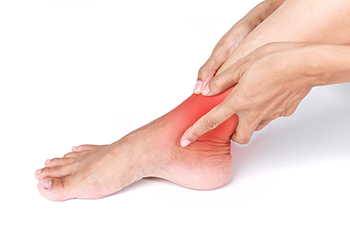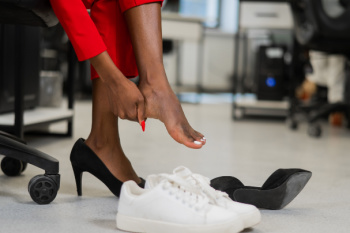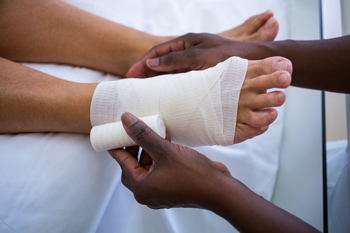
Foot and ankle disorders, such as plantar fasciitis, arthritis, bursitis, and tendonitis, can cause persistent pain and inflammation that interferes with daily life. When rest, targeted exercises, and oral medications are not enough to bring relief, a podiatrist may recommend a steroid injection. These injections contain corticosteroids, which are anti-inflammatory medications delivered directly into the affected area to reduce swelling and ease discomfort. In many cases, they offer temporary but significant relief and allow patients to continue with rehabilitation or maintain mobility. Injections are often used in conjunction with other treatments, such as custom orthotics or stretching routines. Although generally safe, repeated use of steroids in the same area should be carefully monitored to avoid tissue damage. If your foot or ankle pain has not improved with other, more conservative care, it is suggested that you speak with a podiatrist about whether a steroid injection may be appropriate for your condition.
Foot Pain
Foot pain can be extremely painful and debilitating. If you have a foot pain, consult with Dr. Michael A. Wood from Foot Health Institute. Our doctor will assess your condition and provide you with quality foot and ankle treatment.
Causes
Foot pain is a very broad condition that could be caused by one or more ailments. The most common include:
- Bunions
- Hammertoes
- Plantar Fasciitis
- Bone Spurs
- Corns
- Tarsal Tunnel Syndrome
- Ingrown Toenails
- Arthritis (such as Gout, Rheumatoid, and Osteoarthritis)
- Flat Feet
- Injury (from stress fractures, broken toe, foot, ankle, Achilles tendon ruptures, and sprains)
- And more
Diagnosis
To figure out the cause of foot pain, podiatrists utilize several different methods. This can range from simple visual inspections and sensation tests to X-rays and MRI scans. Prior medical history, family medical history, and any recent physical traumatic events will all be taken into consideration for a proper diagnosis.
Treatment
Treatment depends upon the cause of the foot pain. Whether it is resting, staying off the foot, or having surgery; podiatrists have a number of treatment options available for foot pain.
If you have any questions, please feel free to contact one of our offices located in Lansing, and Chicago, IL . We offer the newest diagnostic and treatment technologies for all your foot care needs.

Telling whether an ankle injury is a sprain or a fracture can be problematic. A sprained ankle occurs when the ligaments that support the joint are stretched or torn, often from twisting or rolling the ankle. Sprains can range in severity, from mild overstretching to complete ligament tears. In contrast, a broken ankle involves a fracture of one or more bones, typically the tibia, fibula, or talus. A fracture may be simple with a clean break or complex with multiple fragments. While both injuries can cause swelling, bruising, and pain, a fracture often results in more severe pain and the inability to bear weight. Proper diagnosis may require an X-ray to distinguish between the two. Treatment varies significantly, so it is suggested that you promptly consult a podiatrist for an accurate diagnosis and appropriate treatment solutions.
Foot and ankle trauma is common among athletes and the elderly. If you have concerns that you may have experienced trauma to the foot and ankle, consult with Dr. Michael A. Wood from Foot Health Institute. Our doctor will assess your condition and provide you with quality foot and ankle treatment.
Foot and ankle trauma cover a range of injuries all over the foot; common injuries include:
- Broken bones
- Muscle strains
- Injuries to the tendons and ligaments
- Stress fractures
Symptoms
Symptoms of foot and ankle injuries vary depending on the injury, but more common ones include:
- Bruising
- Inflammation/ Swelling
- Pain
Diagnosis
To properly diagnose the exact type of injury, podiatrists will conduct a number of different tests. Some of these include sensation and visual tests, X-rays, and MRIs. Medical and family histories will also be taken into account.
Treatment
Once the injury has been diagnosed, the podiatrist can than offer the best treatment options for you. In less severe cases, rest and keeping pressure off the foot may be all that’s necessary. Orthotics, such as a specially made shoes, or immobilization devices, like splints or casts, may be deemed necessary. Finally, if the injury is severe enough, surgery may be necessary.
If you have any questions, please feel free to contact one of our offices located in Lansing, and Chicago, IL . We offer the newest diagnostic and treatment technologies for all your foot care needs.

Chronic plantar fasciitis is a common cause of heel pain, especially in active individuals. It occurs when the plantar fascia, the thick band of tissue that runs along the bottom of the foot, becomes inflamed due to repetitive stress or strain. Common causes include overuse, wearing improper footwear, high-impact activities, or an abnormal gait. Symptoms typically include sharp or stabbing pain in the heel, particularly with the first steps in the morning or after prolonged rest. The pain may subside during the day but can return after standing or walking for long periods. A podiatrist can diagnose chronic plantar fasciitis through physical exams and imaging tests. Treatment options include custom orthotics to support the arch, targeted exercises to stretch and strengthen the foot, and anti-inflammatory medication. In more severe cases, injections or even surgery may be necessary. If you are dealing with painful plantar fasciitis, it is suggested that you promptly schedule an appointment to see a podiatrist.
Plantar fasciitis is a common foot condition that is often caused by a strain injury. If you are experiencing heel pain or symptoms of plantar fasciitis, contact Dr. Michael A. Wood from Foot Health Institute. Our doctor can provide the care you need to keep you pain-free and on your feet.
What Is Plantar Fasciitis?
Plantar fasciitis is one of the most common causes of heel pain. The plantar fascia is a ligament that connects your heel to the front of your foot. When this ligament becomes inflamed, plantar fasciitis is the result. If you have plantar fasciitis you will have a stabbing pain that usually occurs with your first steps in the morning. As the day progresses and you walk around more, this pain will start to disappear, but it will return after long periods of standing or sitting.
What Causes Plantar Fasciitis?
- Excessive running
- Having high arches in your feet
- Other foot issues such as flat feet
- Pregnancy (due to the sudden weight gain)
- Being on your feet very often
There are some risk factors that may make you more likely to develop plantar fasciitis compared to others. The condition most commonly affects adults between the ages of 40 and 60. It also tends to affect people who are obese because the extra pounds result in extra stress being placed on the plantar fascia.
Prevention
- Take good care of your feet – Wear shoes that have good arch support and heel cushioning.
- Maintain a healthy weight
- If you are a runner, alternate running with other sports that won’t cause heel pain
There are a variety of treatment options available for plantar fasciitis along with the pain that accompanies it. Additionally, physical therapy is a very important component in the treatment process. It is important that you meet with your podiatrist to determine which treatment option is best for you.
If you have any questions, please feel free to contact one of our offices located in Lansing, and Chicago, IL . We offer the newest diagnostic and treatment technologies for all your foot care needs.

Treatment for gangrene that affects the feet, toes, or ankles focuses on removing dead tissue, fighting infection, and restoring blood flow. A podiatrist may begin by performing debridement. This is a surgical procedure that removes the damaged tissue and helps promote healing. When an infection is involved, antibiotics may be administered through a vein to ensure they reach the affected tissue. If gangrene results from reduced blood supply, surgery may be performed to restore circulation. One method of treating gangrene is bypass surgery, designed to redirect blood flow around a blockage. Another is angioplasty, which uses a small balloon to open a narrowed artery and may include placing a stent. In severe cases, where the affected tissue cannot be saved, loss of a toe or part of the foot may be necessary to prevent the gangrene from spreading. In gangrene linked to diabetic ulcers, hyperbaric oxygen therapy may also be used to increase oxygen levels in the blood and support healing. If you have developed gangrene from a diabetic foot ulcer, it is suggested that you schedule an immediate appointment with a podiatrist for the appropriate wound care.
Wound care is an important part in dealing with diabetes. If you have diabetes and a foot wound or would like more information about wound care for diabetics, consult with Dr. Michael A. Wood from Foot Health Institute. Our doctor will assess your condition and provide you with quality foot and ankle treatment.
What Is Wound Care?
Wound care is the practice of taking proper care of a wound. This can range from the smallest to the largest of wounds. While everyone can benefit from proper wound care, it is much more important for diabetics. Diabetics often suffer from poor blood circulation which causes wounds to heal much slower than they would in a non-diabetic.
What Is the Importance of Wound Care?
While it may not seem apparent with small ulcers on the foot, for diabetics, any size ulcer can become infected. Diabetics often also suffer from neuropathy, or nerve loss. This means they might not even feel when they have an ulcer on their foot. If the wound becomes severely infected, amputation may be necessary. Therefore, it is of the upmost importance to properly care for any and all foot wounds.
How to Care for Wounds
The best way to care for foot wounds is to prevent them. For diabetics, this means daily inspections of the feet for any signs of abnormalities or ulcers. It is also recommended to see a podiatrist several times a year for a foot inspection. If you do have an ulcer, run the wound under water to clear dirt from the wound; then apply antibiotic ointment to the wound and cover with a bandage. Bandages should be changed daily and keeping pressure off the wound is smart. It is advised to see a podiatrist, who can keep an eye on it.
If you have any questions, please feel free to contact one of our offices located in Lansing, and Chicago, IL . We offer the newest diagnostic and treatment technologies for all your foot care needs.
